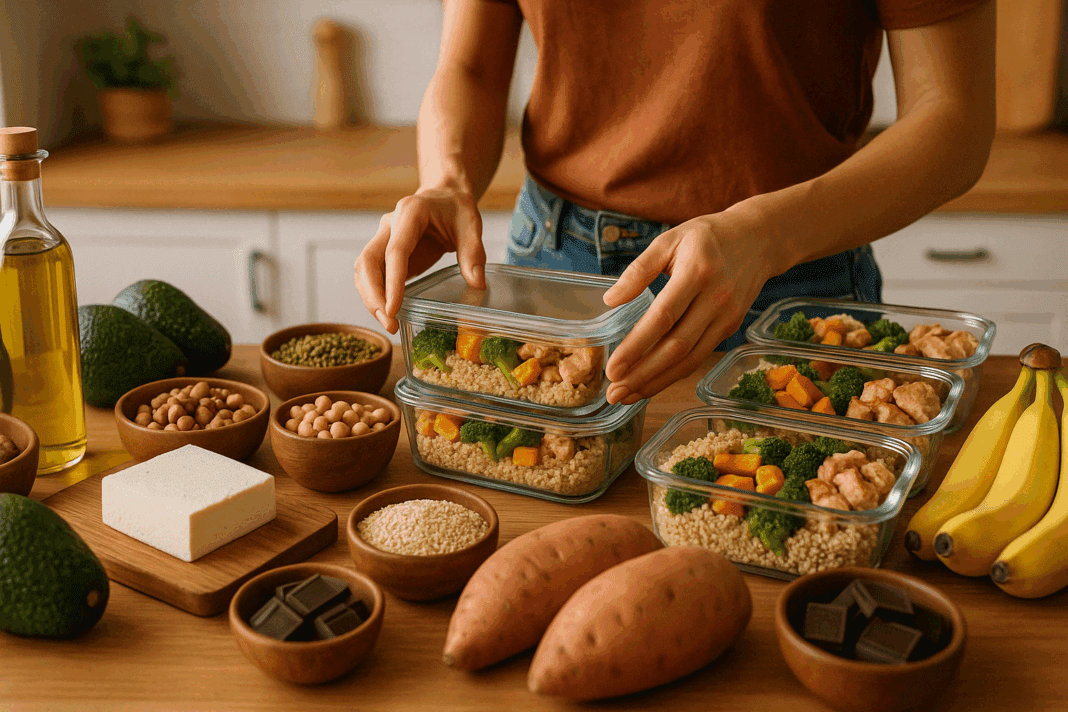Gaining weight in a healthy, sustainable way often requires just as much planning and intentionality as weight loss. While many popular diet trends focus on restriction, cutting carbs, or intermittent fasting, the goal of gaining weight healthfully involves nourishment, consistency, and a smart approach to caloric intake. For individuals looking to build strength, recover from illness, or simply increase their body mass while supporting overall wellness, meal prep for weight gain offers a structured, empowering strategy. Not only does it remove the guesswork from daily eating, but it also ensures that each meal is nutrient-dense, satisfying, and aligned with your body’s evolving needs.
You may also like Smart Meal Prep for Weight Loss: Expert-Approved Lunch Ideas and Recipes to Stay on Track
Unlike crash diets or muscle-building fads that emphasize quantity over quality, mindful weight gain emphasizes whole foods, healthy fats, complex carbohydrates, and balanced macronutrients. Smart meal prep ideas for weight gain go beyond adding more food to your plate—they reflect a deeper understanding of how to fuel your body with intention and expertise. This approach aligns perfectly with the growing interest in holistic health and performance-based nutrition that places equal value on strength, vitality, and long-term sustainability.
Why Smart Meal Prep Matters for Healthy Weight Gain
Healthy weight gain is not about bingeing on processed foods or consuming excess calories without regard for nutritional value. In fact, poor dietary quality can lead to inflammation, blood sugar instability, digestive issues, and low energy—ironically undermining the very goal of increased wellness and strength. Smart meal prep creates a systemized, repeatable way to meet your daily energy needs while staying grounded in whole-food nutrition.
For those with fast metabolisms, increased physical demands, or recovery needs, pre-preparing calorie-dense meals can make all the difference. Planning ahead ensures you don’t miss meals or fall back on convenience foods lacking in nutritional density. It also helps with time management, stress reduction, and consistency—key factors in achieving and maintaining a healthy weight. Thoughtfully constructed meal prep ideas for weight gain include healthy fats like avocados, nuts, and oils; complex carbs like quinoa and sweet potatoes; and high-quality proteins such as tofu, legumes, eggs, and lean meats.
In a landscape where low-carb and keto trends dominate the headlines, it’s essential to clarify what smart meal prep for weight gain is—and what it’s not. It’s not a license to overconsume sugars or rely on heavily processed foods. Nor is it antithetical to mindful eating or balanced nutrition. Rather, it’s an inclusive, thoughtful process that supports health goals with intention and care.
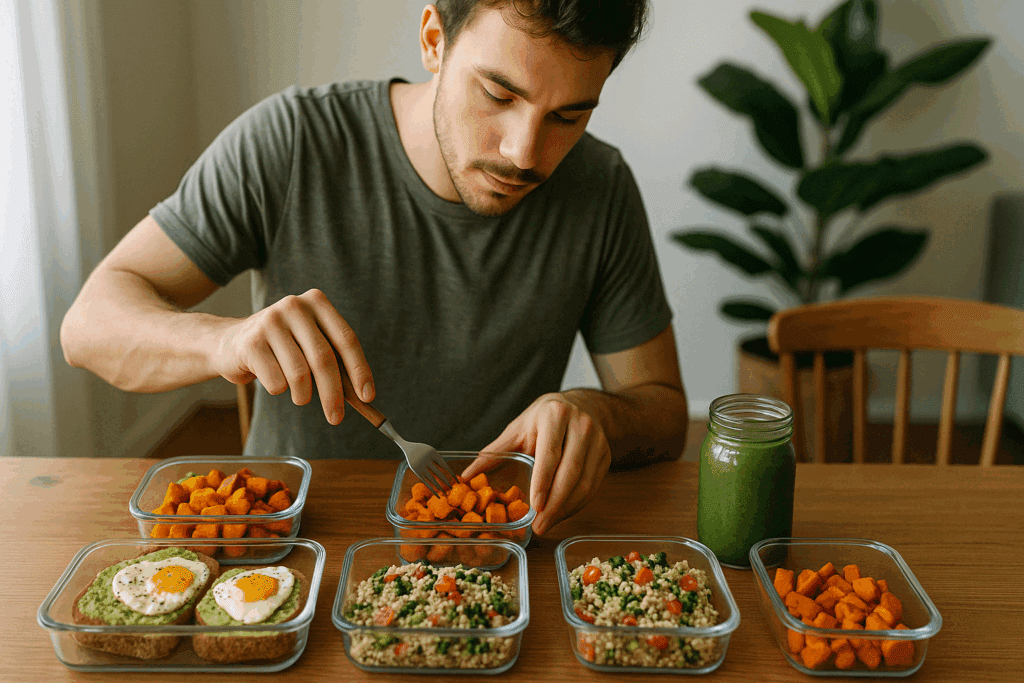
The Nutritional Science Behind Calorie-Dense Eating
To gain weight in a sustainable and healthy way, your body must be in a consistent caloric surplus. This means consuming more energy than you expend—ideally through foods that nourish the body and support physiological repair and growth. High-calorie foods don’t need to be unhealthy; in fact, many of the most nutrient-dense options are naturally rich in healthy fats, protein, and carbohydrates.
Avocados, olive oil, nut butters, tahini, granola, dried fruits, legumes, full-fat dairy, and whole grains are among the top choices. These foods provide more calories per gram while also offering fiber, vitamins, and minerals that promote digestive and metabolic health. This principle is central to successful meal prep for weight gain: the more nutrient-rich your meals, the more your body thrives.
When creating your weekly meal plan, consider incorporating small meals and snacks that are calorically dense but not bulky. For instance, a smoothie with almond butter, oat milk, banana, and protein powder offers a high-calorie profile without being overly filling. Similarly, trail mixes with seeds, dried fruit, and dark chocolate chunks can provide essential nutrients in compact portions.
It’s also important to understand the difference between diets designed for weight loss—such as the ketogenic diet vs low carb approaches—and those designed for weight gain. While low-carb diet keto diet strategies may benefit some individuals with metabolic syndrome or insulin resistance, they are typically not suited for healthy weight gain. Is keto a low carb diet? Absolutely. Is keto a good diet for gaining weight? Not usually—especially if your goal is to increase muscle mass and overall caloric intake. In this case, is a keto diet sustainable for long-term weight gain? Only if significantly modified and closely monitored.
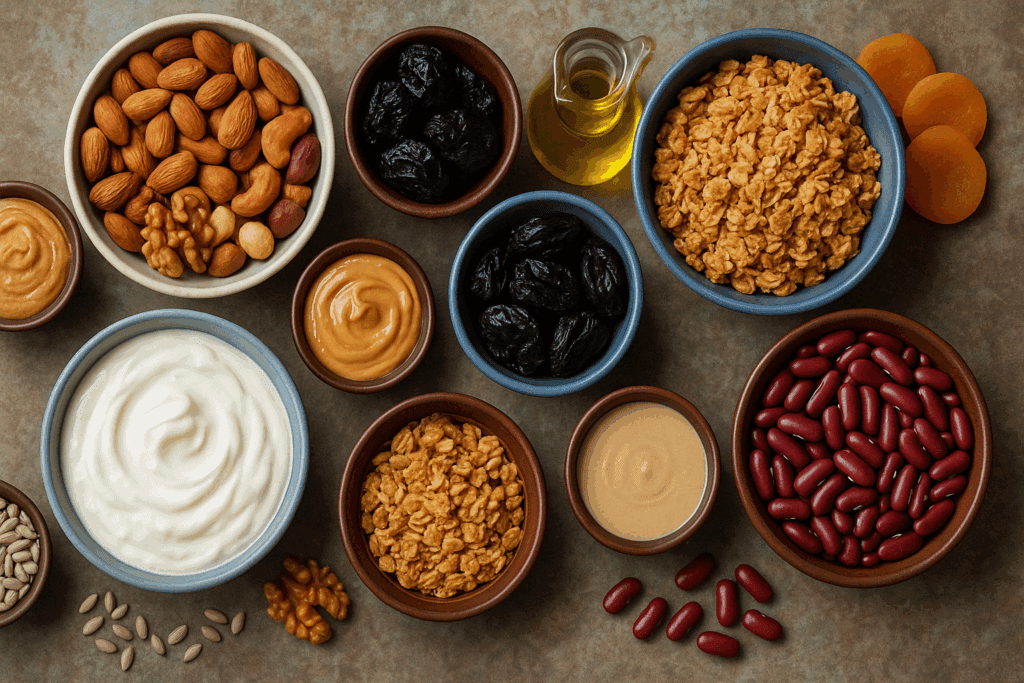
How to Design a Weekly Meal Plan for Weight Gain Success
The foundation of successful meal prep ideas for weight gain lies in structure and personalization. Before diving into specific recipes, take time to assess your caloric needs using a Total Daily Energy Expenditure (TDEE) calculator, which factors in your age, weight, activity level, and goals. Once you know your baseline, add 250 to 500 calories per day for a gradual and sustainable gain.
Start by designing a 3-to-5-day meal prep cycle that includes breakfast, lunch, dinner, and at least two snacks per day. Focus on meals that contain all three macronutrients: carbohydrates, fats, and proteins. Batch-cooking items such as quinoa, lentils, roasted vegetables, stir-fried tofu, or shredded chicken can save time while offering flexibility across different meals.
A smart weekly rotation might include dishes like coconut curry chickpeas over jasmine rice, avocado-egg salad sandwiches, pasta with olive oil and grilled vegetables, and peanut butter banana overnight oats. Keep calorie-boosting ingredients on hand—olive oil, shredded cheese, nut butters, and seed mixes—to easily elevate the caloric value of your meals without increasing volume.
It’s also helpful to prep grab-and-go options such as chia pudding, hummus wraps, granola bars, and high-calorie smoothies. These options are especially useful for individuals with busy schedules or increased physical activity. By maintaining a ready-to-eat stock of meals and snacks, you reduce reliance on impulse decisions and build a consistent routine that supports both wellness and weight gain.
Debunking Myths: Low Carb and Keto Diets vs Weight Gain Goals
In recent years, low-carb and ketogenic diets have gained mainstream attention for their effectiveness in weight loss and metabolic regulation. But what happens when these diets are juxtaposed with the goal of healthy weight gain? Understanding the nuances of the ketogenic diet vs low carb strategies is essential before attempting to apply them in reverse.
The primary characteristic of both approaches is carbohydrate restriction. The keto diet in particular reduces carbs to less than 10% of total daily intake, encouraging the body to burn fat for energy instead of glucose. This metabolic state—ketosis—can support fat loss, improve insulin sensitivity, and potentially benefit neurological function. However, it often leads to appetite suppression and lower overall calorie consumption.
This makes keto a difficult framework to adapt for weight gain. Is keto no carbs? Not entirely, but the severe carb restriction doesn’t align with the principles of caloric surplus and macronutrient balance. Additionally, is keto a good diet for individuals looking to increase lean muscle mass and gain strength? For most, the answer is no—especially if the diet limits protein intake or lacks diversity in whole food options. Finally, is a keto diet sustainable for those with higher caloric needs? Only under medical supervision with significant modifications.
By contrast, smart meal prep for weight gain emphasizes diverse food groups and balanced macronutrient distribution. Instead of focusing on ketosis, it supports metabolic function through adequate carbohydrate intake—essential for energy, muscle repair, and hormonal balance. In this way, a low carb diet keto diet framework is fundamentally misaligned with the goals of healthy, sustained weight gain.
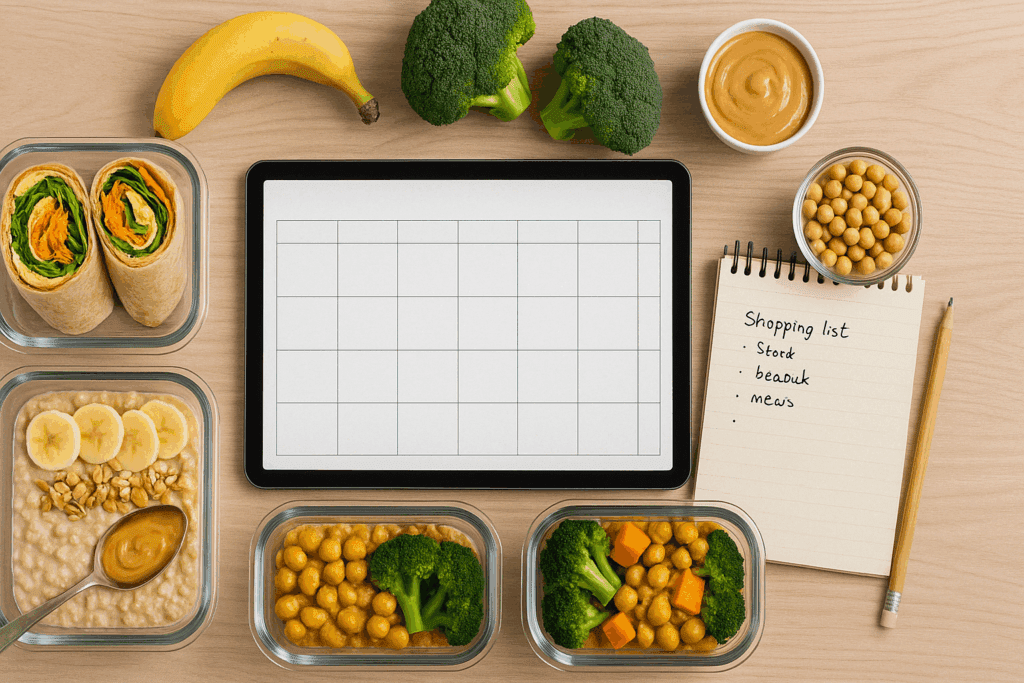
Building Strength with Balanced Macronutrients and Micronutrients
Beyond simply increasing calories, meal prep for weight gain must also emphasize the quality of nutrients to support physical performance, recovery, and wellness. Protein is essential for muscle synthesis and repair, while carbohydrates fuel training and daily function. Healthy fats support hormonal balance, brain health, and absorption of fat-soluble vitamins like A, D, E, and K.
Each meal should reflect this balance. For example, a quinoa salad with roasted sweet potatoes, black beans, tahini dressing, and pumpkin seeds offers all three macronutrients, along with iron, zinc, magnesium, and fiber. Similarly, a breakfast of oats with full-fat Greek yogurt, walnuts, honey, and berries provides sustained energy and promotes digestive and immune health.
Micronutrients play a critical role in optimizing health during the weight gain process. Iron, B vitamins, calcium, and antioxidants all contribute to the body’s ability to recover, grow, and maintain equilibrium. Smart meal prep ensures these elements are consistently included in the diet through a colorful variety of vegetables, fruits, legumes, grains, and healthy animal or plant-based proteins.
While meal prep ideas for weight gain should aim to increase calories, they should never sacrifice nutritional integrity. Avoiding overly processed or sugary options ensures that the weight gained is healthful, sustainable, and performance-enhancing. Through careful planning and mindful selection of ingredients, your meals become tools for building strength—not just adding weight.
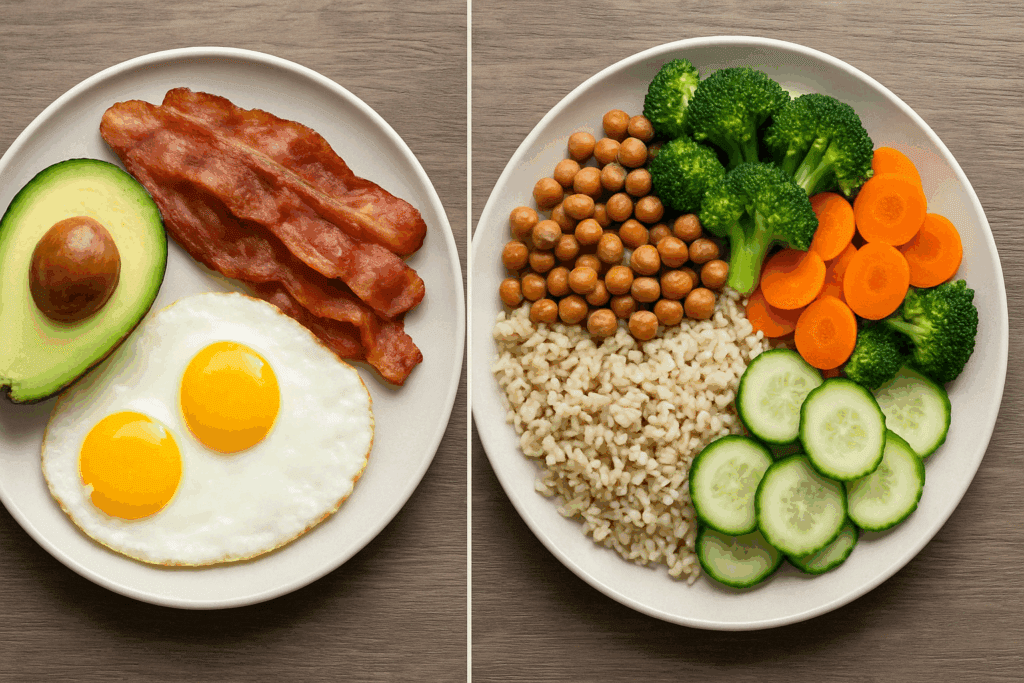
Sustainable Meal Prep Strategies for Long-Term Success
Long-term success in gaining weight and maintaining optimal health hinges on sustainability. Smart meal prep is not a one-time effort but a lifestyle strategy that evolves with your goals, preferences, and schedule. The key is to make the process enjoyable, customizable, and adaptable.
Rotate recipes every few weeks to prevent palate fatigue, and explore new cuisines to keep things exciting. Create a prep schedule that suits your week—whether that means bulk cooking on Sundays or preparing small batches daily. Invest in high-quality storage containers, insulated lunch boxes, and kitchen appliances like slow cookers or air fryers to streamline the process.
Tracking your progress can also be motivating. Use apps or journals to monitor your meals, energy levels, and weight changes. This feedback loop allows for real-time adjustments and reinforces positive habits. When needed, consult a registered dietitian or nutritionist to refine your strategy and ensure your nutrient intake is well-rounded.
Ultimately, the question isn’t just “is keto a low carb diet” or “is keto a good diet”—it’s whether any given eating style aligns with your unique goals and values. For those pursuing mindful, balanced, and health-affirming weight gain, whole-food-based meal prep remains a gold standard. It empowers you to take control of your nutrition while honoring your body’s needs.

Frequently Asked Questions: Smart Meal Prep for Weight Gain
1. How can I ensure variety in my meal prep for weight gain without compromising consistency?
To maintain both variety and consistency in your meal prep for weight gain, consider rotating your core ingredients every week while keeping your macronutrient targets stable. For instance, you might alternate between lentils, chickpeas, and black beans for protein, or switch from brown rice to couscous to sweet potatoes for carbohydrates. This approach keeps your meals interesting while preserving the caloric and nutritional density needed to support your weight gain efforts. Additionally, changing up your herbs, spices, and dressings introduces flavor complexity without sacrificing nutritional goals. Investing in a seasonal produce calendar can also help you diversify your meal prep ideas for weight gain naturally throughout the year.
2. What are some lesser-known ingredients that can boost calories without increasing meal volume?
Some underrated calorie-boosters include coconut cream, ghee, ground flaxseed, wheat germ, and date syrup. These ingredients offer both flavor and energy density in small quantities, making them perfect for those struggling with appetite or gastrointestinal volume. You can easily add coconut cream to soups or smoothies, and incorporate wheat germ into oatmeal or baked goods. Date syrup adds natural sweetness and extra calories to snacks without relying on refined sugars. Including these items in your meal prep for weight gain adds nuance and depth while subtly raising your caloric intake.
3. How can I adapt meal prep for weight gain if I follow a plant-based diet?
A plant-based approach to meal prep for weight gain can be highly effective with the right strategy. Focus on energy-dense foods like nuts, seeds, tofu, tempeh, avocado, and whole grains like millet and amaranth. Nutritional yeast and fortified plant milks can help bridge the gap for micronutrients such as B12 and calcium. Many meal prep ideas for weight gain in plant-based diets revolve around layering ingredients—like using hummus and tahini in wraps, or blending nut butters into smoothies. Balancing protein sources like legumes with healthy fats ensures you’re getting both calories and satiety from every bite.
4. How can I structure meals around a busy work schedule while still focusing on weight gain?
If you’re short on time, opt for a modular meal prep for weight gain strategy: prepare building blocks like grains, roasted vegetables, proteins, and sauces separately. These can be mixed and matched throughout the week depending on your available time and energy. Store your meals in stackable containers labeled by day and caloric goal. Keep quick snacks on hand, such as high-calorie energy balls or trail mix blends, to prevent long gaps between meals. This structured but flexible approach to meal prep ideas for weight gain supports consistent eating even with an unpredictable schedule.
5. Are there psychological hurdles that can affect meal prep for weight gain, and how can they be addressed?
Yes, psychological factors such as fear of eating more, past experiences with restrictive dieting, or body image concerns can all interfere with the consistency needed in meal prep for weight gain. Addressing these challenges often requires support from registered dietitians, therapists, or support groups. Journaling or practicing mindful eating can help reconnect you with hunger cues and emotional triggers. Setting realistic, gradual goals may ease the transition into a higher-calorie routine. Integrating positive affirmations or body-neutral language while planning your meal prep ideas for weight gain can also promote a healthier mental relationship with food.
6. Can smart meal prep for weight gain support athletic performance and recovery?
Absolutely—thoughtful meal prep for weight gain is ideal for athletes aiming to build muscle or recover from intense training. Emphasizing pre- and post-workout meals that are rich in protein and carbohydrates helps replenish glycogen stores and support muscle synthesis. Including anti-inflammatory foods such as tart cherry juice, turmeric, and omega-3-rich seeds supports recovery and reduces muscle soreness. You can tailor your meal prep ideas for weight gain to align with your training schedule, ensuring you never miss the critical post-exercise nutrition window. Meal prepping also allows you to manage portion sizes to match different phases of your training cycle.
7. What are common mistakes people make with meal prep for weight gain, and how can they avoid them?
One common mistake is underestimating calorie needs by focusing only on portion sizes rather than caloric density. Another is neglecting snacks, which can contribute significantly to daily caloric intake. Some also rely too heavily on low-fat or low-carb options, which are better suited for weight loss contexts. To avoid these pitfalls, track your intake periodically to ensure you’re in a surplus, and prioritize ingredients like oils, full-fat dairy, and grains. By expanding your meal prep ideas for weight gain to include calorie-dense condiments and snacks, you build an effective, realistic eating strategy.
8. How can I prevent food fatigue when eating calorie-dense meals every day?
Preventing food fatigue is key in sustaining a successful meal prep for weight gain strategy. One effective method is to rotate flavors and cuisines weekly—for instance, alternating between Mediterranean, South Asian, and Latin-inspired dishes. Using sauces like chimichurri, peanut curry, or romesco can dramatically change the flavor profile of otherwise similar base ingredients. Also, incorporating texture—like roasted chickpeas, crunchy seeds, or crispy tofu—adds sensory interest to your meals. By expanding your meal prep ideas for weight gain beyond just calories to include taste and texture, you’ll increase enjoyment and long-term adherence.
9. What are some advanced strategies for tracking progress with meal prep for weight gain?
Beyond tracking weight on the scale, you can monitor changes in strength, energy levels, and muscle mass using bioimpedance scales or body composition scans. Keeping a meal prep journal that includes not just what you ate but how you felt afterward can reveal patterns in appetite and digestion. Consider photographing your meals weekly to observe portion progression over time. Nutrient tracking apps can help you detect trends in macro and micronutrient intake, guiding more precise adjustments to your meal prep ideas for weight gain. For athletes or those with specific body composition goals, monthly progress photos and strength benchmarks offer additional feedback.
10. How might future innovations in nutrition tech enhance meal prep for weight gain?
Emerging technologies like personalized nutrition apps, AI-based meal planning tools, and smart kitchen appliances are set to revolutionize how we approach meal prep for weight gain. Apps that integrate genetic data, gut microbiome profiles, or metabolic rates can offer hyper-personalized recommendations. Smart scales and portioning tools can automatically log food quantities and caloric values, reducing manual tracking. Innovations in plant-based food engineering—like protein-rich legumes or calorie-enhanced dairy alternatives—expand the toolkit of meal prep ideas for weight gain, especially for those with dietary restrictions. As technology evolves, it will offer increasingly sophisticated ways to plan, execute, and optimize high-calorie meal strategies for health-focused weight gain.
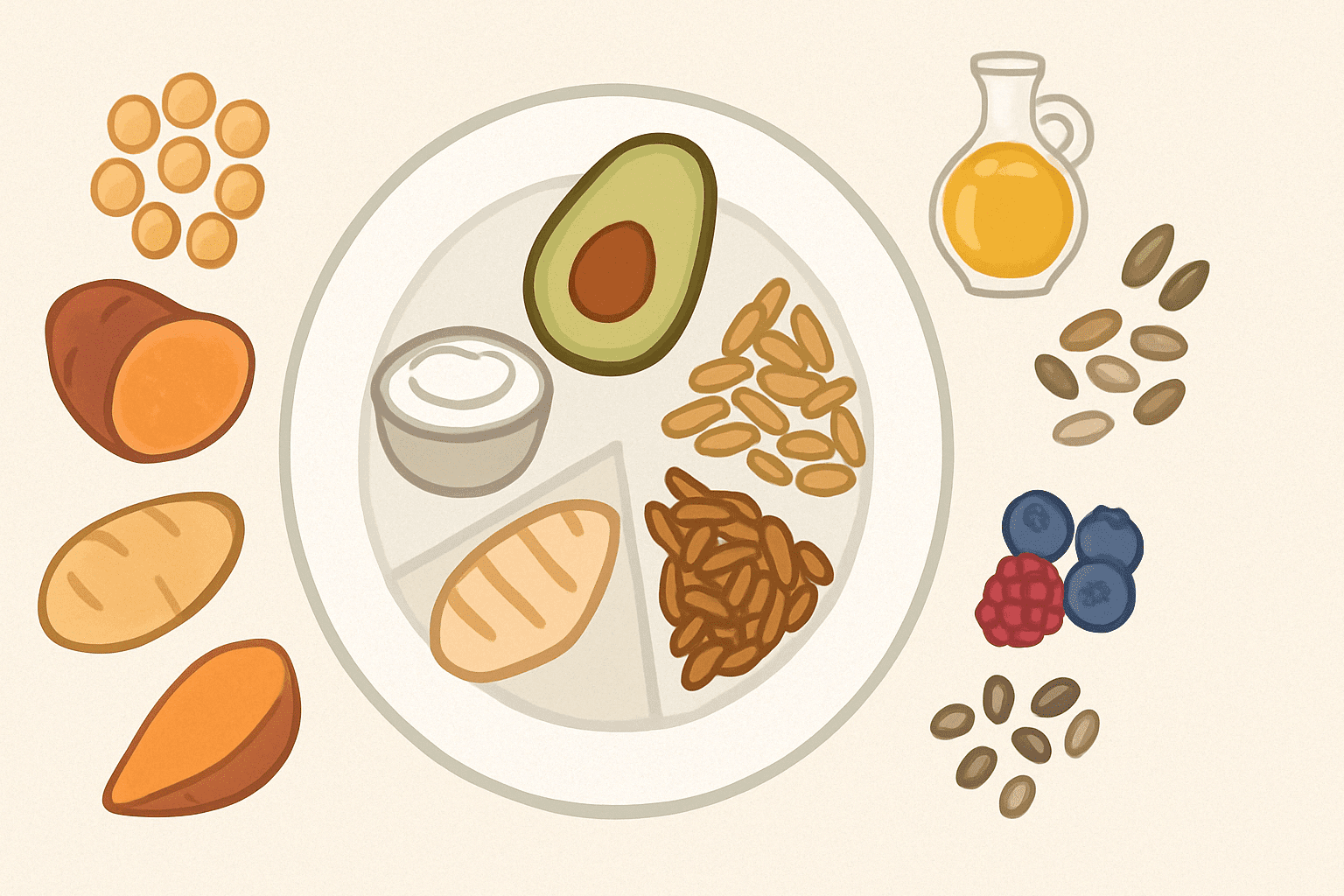
Conclusion: Why Smart Meal Prep for Weight Gain is a Health-First Approach to Building Strength and Wellness
Smart meal prep for weight gain is more than a nutritional tactic—it’s a philosophy rooted in care, intention, and evidence-based practice. It rejects the extremes of fad diets and instead embraces balance, nourishment, and sustainability. By crafting calorie-dense yet nutrient-rich meals, individuals can achieve their weight and strength goals without compromising long-term health.
This approach stands in contrast to popular dietary narratives, including the ketogenic diet vs low carb conversation. While it’s true that is keto a low carb diet and that is keto a good diet for some medical applications, it’s not the ideal model for health-focused weight gain. In fact, is a keto diet sustainable for supporting ongoing caloric surplus, muscular growth, and micronutrient adequacy? Only with deliberate, often medically supervised modifications.
Instead, the focus should remain on meals that deliver both energy and nourishment. By integrating whole grains, healthy fats, quality proteins, and colorful produce into your routine, you lay the foundation for vibrant health. The best meal prep ideas for weight gain honor both your wellness and your goals—empowering you with each bite.
Through structure, creativity, and nutritional wisdom, smart meal prep becomes not just a means to an end, but a daily act of self-care. Whether you’re recovering, training, or simply striving for a more energized lifestyle, intentional eating provides the clarity and confidence you need to thrive.
Was this article helpful? Don’t let it stop with you. Share it right now with someone who needs to see it—whether it’s a friend, a colleague, or your whole network. And if staying ahead on this topic matters to you, subscribe to this publication for the most up-to-date information. You’ll get the latest insights delivered straight to you—no searching, no missing out.
Further Reading:
7-Day Healthy Weight-Gain Meal Plan

